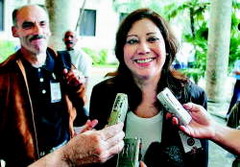Members of Congress go to Cuba seeking to improve relations
- Submitted by: admin
- International
- North America
- Politics and Government
- 12 / 16 / 2006

Ten U.S. House members were expected to discuss the possibility of easing U.S. trade and travel sanctions in meetings with Communist officials. They also scheduled talks with Cuba's Catholic Cardinal Jaime Ortega, as well as foreign diplomats, during their trip, which ends Sunday.
Reps. Jeff Flake, R-Ariz., and William Delahunt, D-Mass., led the group - said to be the largest congressional delegation to visit the island since the 1959 Cuban revolution. Both legislators advocate ending decades-old trade and travel sanctions against Cuba.
"This certainly seems like a good time to move ahead," Flake said. "I think that there is more momentum to move ahead than we have had in a while."
The Bush administration, meanwhile, has over the past six years adopted measures aimed at further squeezing the island's economy and undermining Cuba's Communist leaders.
The delegation reportedly asked to see Defense Minister Raul Castro, who leads Cuba as his brother Fidel recovers from intestinal surgery. It was not clear Friday if the meeting would take place.
The trip comes amid growing uncertainty about the health of Fidel Castro, the island's 80-year-old leader, who has not been seen in public since he underwent surgery in July. He temporarily ceded his powers to his 75-year-old brother Raul.
Raul Castro has offered to talk with Washington about its differences with Cuba. The Bush administration says there will be no dialogue until Cuba holds free and competitive elections and releases its roughly 300 political prisoners.
"I think that there is a significant majority in the U.S. Congress that believes it is time to engage in dialogue," Delahunt said.
The Bush administration in the fall added $80 million to programs seeking to promote the transition to a U.S.-style democracy in post-Fidel Cuba.
Communist officials call the groups receiving the money "mercenary" and "counterrevolutionary." They insist Cuba will not abandon communism after Fidel Castro is gone. Instead, they say, a collective leadership will preserve the current economic and political system.
On the eve of the congressional visit, the Communist Party newspaper Granma published a lengthy editorial criticizing U.S. funding of Cuban opposition groups.
The editorial cited a recent study, requested by Flake and Delahunt, which concluded that the U.S. Agency for International Development failed to keep track of spending by Cuban groups running pro-democracy programs. The report found some groups used part of their money for questionable purchases, including cashmere sweaters and chocolate.
Source: Buffalo News
Comments